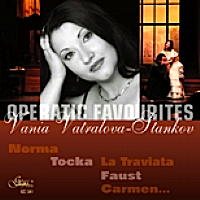
A Lyric Voice
Arias performed by
Vania Vatralova-Stankov -
reviewed by
ROBERT HUGILL'... a richness and depth ...'
|

|
Vania Vatralova-Stankov is a young Bulgarian soprano who trained at first in her home town of Varna and then in Spain, at the Royal Conservatoire of Music and the Royal Opera School in Madrid. She is now based in the UK and has performed at the Welsh National Opera Studio as well as taking the title role in Donizetti's Anna Bolena for the Tower of London Festival.
This is her début recital, made in her native Bulgaria with a Bulgarian orchestra (the Sofia Symphony Orchestra) and an English conductor, Noël Tredinnick. It is released on the Bulgarian label, Gega New.
Obviously, any singer must hope that their début recital disc will go some way to forwarding their career; that the CD will act as a calling card and a showcase for their roles, both actual and potential. Vania Vatralova-Stankov has chosen to give us a selection of arias from operatic standards, with hardly any excursions into more unusual repertoire. This means that the CD will inevitably be compared to others covering the same or similar ground; frankly I would have preferred it if Vatralova-Stankov had been a little more adventurous and given us a few lesser-known items.
She opens with Casta Diva from Norma; unforgivably we don't get the cabaletta. This opening aria gives us a fair summary of Vatralova-Stankov's voice and artistry, along with how this has been captured on disc; it acts as a reasonable signpost for the remainder of the disc.
Listen -- Bellini: Casta Diva (Norma Act I)
(track 1, 1:20-2:25) © 2008 Gega New
She seems to have a lyric voice, but one which has a richness and depth to it. There is a good sense of line but combined with a strong and quite distinctive vibrato. This gives a rather old fashioned feeling to the voice. It is generally on the light side for Norma. But Vatralova-Stankov is essentially lyric and she does not seem at her best in the coloratura.
I suspect that, were one to hear her in the theatre, you would come away with the impression of someone with an attractive and distinctive lyric voice. But on this disc, the recording engineers do not seem to have captured her voice at its most atmospheric. The recording feels as if Vatralova-Stankov was recorded just a shade too closely. Her vibrato is a little too insistent and her upper register can sound uneven and a little wayward. This is true of most of the arias on the disc. Perhaps someone wanted Vatralova-Stankov's voice to sound like this, but I find it very difficult to believe. I remain convinced that there is a lovelier voice in there somewhere.
Vatralova-Stankov's Norma is a bit generalised, which leads one to suspect that she has not performed the role on stage. The arias which show her at her best are the ones from Anna Bolena (title role) and Carmen (Micaela), both of which she has performed on stage.
In fact the Micaela performance has some of the loveliest singing on the disc. And in both arias she displays a feeling for detail which is very different to the generalised sweep of some of her interpretations. Her Anna Bolena is characterised by a beautifully generous phrasing, but some of the acuti sound uncomfortable; again, I suspect recording rather than vocal problems.
When we come to La Traviata, Vatralova-Stankov takes the opening quite slowly and steadily. She gives the impression of being most at home in slower, lyrical roles. Still at least we do, of course, get the cabaletta here.
Listen -- Verdi: E strano ... Follie, follie ... Sempre libera (La Traviata Act I)
(track 3, 5:35-6:30) © 2008 Gega New
We also get a very creditable Mimi, marred only by a slight hardness of tone at the top. The aria from Gianni Schicci comes over fine as a concert piece, but Vatralova-Stankov hardly sounds dramatically convincing as a young girl.
Possibly the best overall piece of singing on the CD is in the opening of Signore ascolta from Turandot. Here Vatralova-Stankov sounds a little like Caballé in the role. Caballé is a singer with whom Vatralova-Stankov has done masterclasses and she would do well to imitate Caballé's vocal control.
Listen -- Puccini: Signore ascolta (Turandot Act I)
(track 7, 0:00-0:50) © 2008 Gega New
Neither of the two Gounod items show Vatralova-Stankov at her best: they both manage to mix some lovely singing with rather smudged fioriture.
She is reasonably well served by Noël Tredinnick and the Sofia Symphony Orchestra. Some of Tredinnick's speeds seem a little on the steady side, but that was presumably the singer's choice. The orchestra acquit themselves creditably though they sometimes seem a little metronomic.
On the showing of this disc Vatralova-Stankov is a talented young soprano, but this début recital fails to do her complete justice. She would have been well advised to concentrate on roles that really suited her lyric voice; there is a little too much smudged coloratura on display. And she seems to have been let down by the recording which fails to display her voice in the best light possible. If, on the other hand, this disc is an accurate reflection of her voice, then she would do well to work on her upper register and address her strong vibrato.
Copyright © 7 January 2009
Robert Hugill, London UK
 BUY CLASSICAL CDS ONLINE
CD INFORMATION: OPERATIC FAVOURITES - VANIA VATRALOVA-STANKOV
BUY CLASSICAL CDS ONLINE
CD INFORMATION: OPERATIC FAVOURITES - VANIA VATRALOVA-STANKOV
| 
